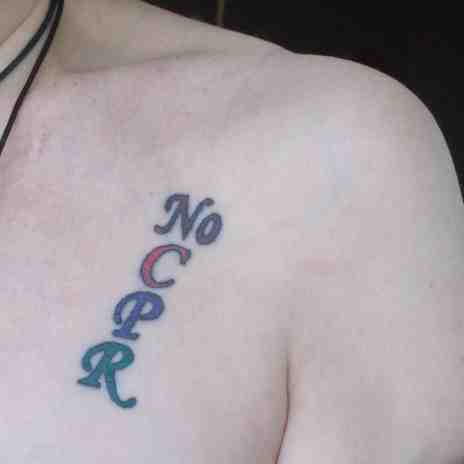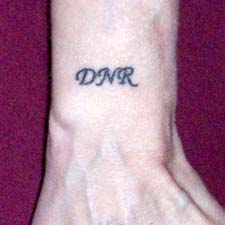|
Clarification
of new terms:
After winning the right to continue to use
the term 'death midwife' in the lower Supreme
court (CMBC
vs MaryMoon),
it was lost in the appeal (CMBC/AGBC
vs MaryMoon).
Although
we are continuing to explore ways to reclaim
the term 'death midwife', we are legally
bound (in BC) to use new terms for the time
being. The terms we are currently
using are:
Practitioner
of death midwifery: someone who is practicing
the philosophy of midwifery applied to deathcare,
through the pan-death continuum.
Pan-death
guide: someone who offers death midwifery
support in a continuum of pre-death (EOL/death
doula role), immediately after death (home
funeral guide role), and funeral/memorial
ceremonies (celebrant role).
For
the most part on this site, 'practitioner
of death midwifery' and 'pan-death guide'
will be used interchangeably. We
realize that this may be a little confusing.
However, we felt it was important
to retain the connection to 'death midwifery'
(philosophy), as well as have a term that
describes 'what they do' (approach in practice)
— as 'death midwife' did both.
Disclaimer:
Practitioners of death midwifery/pan-death
guides are not conventional (birth) midwives
or health professionals, nor are they members
of any of the Colleges of Midwives in Canada

The
important of ACP —
'Voice = Choice'
Advance-care
planning may be one of the most important
preparations for your life that you ever
make — certainly as important as a
will or Power of Attorney (finances
and legal issues) document, or even
a retirement fund. Its focus
is maintaining your individual choice about
how your life progresses — your own
specific 'voice' — especially when
you may not be able to speak for yourself.
At that difficult moment —
when you receive a terminal diagnosis or
find out that you have a progressive chronic
illness, or recognize that you are in early-stage
dementia, or suffer any of the range of
unexpected medical conditions (stroke,
coma, serious accident, etc.) —
the primary issue of your life will likely
be your health and personal care. [Note:
an Advance Directive only comes into effect
when you are not able to speak for yourself.
If you are capable of answering
simple questions —
even with a hand movement or blink of your
eyes — you will retain the power to
make immediate choices on your treatment.]
Until
the 1970s, many accidents and chronic illnesses
resulted in an immediate death or fairly
short dying period. That has
radically changed in the last several decades.
Paramedics and hospitals provide
immediate support to those in accidents
or with heart attacks/etc.; and modern technology
and practices have lengthened the time in
which one might be nearing death. Our
culture has not yet caught up with the personal
and practical implications: although most
people recognize that they should do advance-care
planning (even early in life,
before any concern about their health),
few actually do it — as the studies
below show.
| In
2004, the Canadian Hospice and Palliative
Care Association and GlaxoSmithKline
released the results of an Ipsos-Reid
survey of 1055 Canadians (Ipsos-Reid,
2004). Part of this survey
assessed attitudes and behaviours relating
to ACP. With this sample size the results
are considered to accurately reflect,
within 3.1 percentage points, the entire
adult Canadian population had it been
polled. |
|
|
|
U.S.
National Health Statistics Report
April 27, 2011
During 2007, patients under age 45
had a significantly lower likelihood
of having advance care planning at
interview than older patients (12.0%
compared with 21.2% of those aged
45-64 and 33.6% aged 65 or over.
White home health care patients were
about 2½ times as likely to
have advance care planning as black
home health care patients (32.0% compared
with 12.5%).
Living
wills (16.8%)
and durable power of attorney (13.7%)
were the two most common types of
advance care planning instruments
reported for home health care patients;
about 8% (data not
shown) of home health care
patients had both a living will and
a durable power of attorney.
|
|
Survey
results revealed that:
|
| |
70%
of Canadians had not prepared a living
will (p. 55). |
| |
The
majority of Canadians (eight in ten)
agreed that people should start planning
for EOL when they are healthy (p.49) |
Home
health care patients with advance care
planning at interview, by age and race:
United States, 2007 |
| 47%
of Canadians have not designated a surrogate
decision-maker (p. 55). |
| Fewer
than 44% Canadians have discussed EOL
care with a family member (p. 53). |
|
12% |
—
under 45 years of age |
| 21.2% |
—
45-64 |
| Although
Canadians felt that EOL care was an
important discussion to have with a
physician, only 9% had done so (p. 53). |
|
23.9% |
—
65-74 |
| |
33.6% |
—
75-84 |
| |
41.6% |
—
85+ |
| Source:
B.C. Cancer's Cross Cultural Considerations
in Promoting Advance Care Planning in
Canada (2008) |
Source:
CDC/NCHS
National Home and Hospice Care survey
2007 |
Every health-care website — whether
sponsored by the government, various associations
focusing on specific illnesses/conditions,
or health/personal care agencies —
is now encouraging their readers to address
their advance-care planning
(ACP) NOW, before the on-set of a
chronic illness or a sudden medical condition.
|
All
of us would like to believe that we
will be aware enough to make the necessary
medical/personal care choices when
needed, and that we only need to worry
about that (if at all)
towards the very end of our life.
Unfortunately, accidents
and chronic illnesses can change our
lives unpredictably, even in our early
adult years.
We
would also like to believe that our
families will understand what our
wishes would be, and be available
to pro-actively advocate for them.
However, in the modern
world, many family members live at
great distances from one another,
have different lifestyles and approaches
to 'end of life' issues, and/or may
be estranged. You need
to ensure that 'your voice' in decisions
is truly 'your choice' — and
not the fears or biases of others
(whether family members,
friends or medical staff).
|
|
"My
eighteen-year-old daughter and only
child, Amy, was involved in a car accident
in 2001… It was understandable
why having an advance directive that
would ensure her dignity and quality
of life up to the end had become of
utmost importance to Amy (which she
did do)... I knew that Amy was counting
on me to speak her mind for her. I
did what she asked… Honoring Amy's
wishes by allowing her to die was…is…well…hard
beyond description by the spoken or
written word. But
as I struggle to endure my grief and
loss, I have peace of mind in knowing
that what I did for Amy was right."
(from article written
by her mother, on
the Compassion and Choices website,
called Amy's
Story
—
also author
of "PINKY-SWEAR:
Honoring My Daughter's Right to Die") |
(return
to top)

What
is Advance-Care Planning & what does
Journeying Beyond
offer?
The
more formal elements of ACP (advance-care
planning) are an Advance Directive (now
a legal document in itself in B.C.)
and a Representation Agreement. However,
ACP also includes all choices for your pan-death
experience (that is, pre-death,
especially after terminal diagnosis or with
a progressive chronic illness; and post-death,
including post-death care, and funeral and/or
memorial arrangements). These
less formal choices are often referred to
as 'Expressed Wishes' or 'Personal-care
Choices'.

An
Advance Directive
is a legal document stating your choices
for medical treatment that speaks for you
—
'your voice' —
if/when you are not able to speak for yourself.
As of September 2011 in B.C.,
your choices in this document legally have
to be followed by your substitute decision-maker/Representative
and all medical staff. Therefore,
it is important to make your choices very
clear, and available in a written document
(although verbal wishes will
be considered as well). Your
GP and specialists should also have a copy
in advance, AND be willing to follow it
— otherwise, you might consider finding
new doctors before a Representation Agreement
or Advance Directive would come into play.
|
[Note:
paramedics are not required to follow
the Advance Directive, unless they
are made aware of it in time. They
will often check the fridge door to
see if one has been posted there.
You can also use a medical
alert bracelet for a 'No CPR' (DNR
order) —
although this is only one element
of an Advance Directive. Other
means of notifying paramedics of a
'No CPR' order are a wallet card or
tattoo (on your chest or wrist).]
It
is imperative that you discuss your
choices (preferably
in a written Advance Directive)
with all of your family members and
close friends; and that your substitute
decision-maker/ Representative, doctor,
and any medical facility caring for
you have a copy of the Advance Directive
as well.
|
|
One
person's approach
to a clear 'No CPR'/DNR order
|

'No
CPR' tattoed her left chest
|

'DNR'
tattooed on her right wrist
|
Journeying
Beyond 's 'EOL consulting
services' uses a very comprehensive values-based
Advance Directive that covers all major
medical situations and possible interventions,
the primarily options for treatment (or
not, as you wish), and space to personalize
your choices even further — as well
as 11 appendixes supporting the clarification
of your 'expressed wishes/personal care'
options. [Note: A
condensed version —
outlining the topics of the medical condition
and personal-care options —
can be downloaded by clicking here.]
| Journeying
Beyond provides |
| |
 |
a
copy of the full Advance Directive/Expressed
Wishes template, |
 |
explanation
of what the medical conditions and treatment
options in the template refer to, |
 |
direct
support to work through your choices,
and |
 |
a
final review of the document to ensure
that there are no contradictions in
choices — |
 |
as well as facilitating meetings with
family and close friends to discuss
the options and support you in your
choices. |
(return
to top)

Expressed
Wishes/Personal-care Choices
Journeying
Beyond also provides support
to clarify your Expressed Wishes —
both pre-death and post-death (please
see Journeying
Beyond''s Practitioner of Death Midwifery
Services on the Death
Midwifery page for further clarification
of range of initial options).
Journeying
Beyond (through
E~merging Beyond services)
can also provide mediation sessions —
if family members or friends have serious
concerns about your Advance Directive choices,
there is dissention over who should be named
as your legal Representative, or other tensions
arising out of your choices.
(return
to top)

A
Representation Agreement is a legal
means by which you choose a specific person
who will both advocate for your choices
in your Advance Directive, and make medical
or personal-care decisions in unforeseen
circumstances (based on a
consistency with the specific choices within
your Advance Directive). As
of September 2011 in B.C., it is not necessary
to consult with a lawyer to write a Representation
Agreement (for either Standard/section
7 version —
which is for general health and personal
care decisions, or a Enhanced/section 9
version —
which includes withholding or withdrawing
life-support). [Note:
a considerable amount of information on
Advance Directive and Representation Agreements
poses them as mutually-exclusive, or at
least conflicting, documents. They
are not —
although, now in B.C., an Advance Directive
has priority over a Representative's decisions.
However, properly worded, they
are collaborative documents: and Journeying
Beyond recommends that you
have both.]
Your
Representative can be a specific family
member (one who you trust
to follow your choices) or a close
friend. In either case, you
need to discuss your choices with them thoroughly,
and make sure that they are willing to follow
your directions (even if
they may not be consistent with your Representative's
own personal choices or values).
It is wise to have at least
one alternative Representative (who
can take over if your primary Representative
is not available), and possibly even
a second alternate (which
might be your faith community, or any other
group/organization that you are closely
involved with). Your
Representatives should have at least one
copy of your Advance Directive for themselves,
and a few other copies to make available
to any medical staff that is treating you.
Journeying
Beyond
provides a Representation Agreement
template, which was specifically developed
to accompany its Advance Directive and ensures
that the two documents are consistent with
each other. The service also
provides an explanation of the options within
a Representation Agreement, support to fill
the agreement out, and facilitation of meetings
with your Representatives to clarify their
role (as well as helping
you to clarify your choices in the Advance
Directive to them).
(return
to top)

A
Power of Attorney document is the legal
document which names a specific person (your
'attorney' re this document) to take
care of your financial and legal concerns,
if you are not able to (before
your death: executor deals with all financial/legal
issues post-death). In
B.C., it does not including health and personal-care
issues (that is in the Representation
Agreement, which is separate); and
does not need to be draw-up or signed by
a lawyer. There are four
different variations of the document —
mostly based on when and how Power of Attorney
comes into effect (the major
ones are enduring — starting
before 'incapacity' and continuing until
death; and springing —
starts only when deemed 'incapable', or
otherwise unable to speak for one's self,
and continuing until death or recovery).
Journeying
Beyond
provides a basic Power of Attorney
document. If your financial
or legal affairs are complicated, we recommend
that you consult with a lawyer and/or accountant.
[Note: if you explore
the internet for information on types of
Power of Attorney, please make sure that
you are reading post-2011 material —
the time when the B.C. government clarified
the focus and limitations of PoA responsibilities,
as well as the 4 different kinds; and that
PoAs no longer require the signature of
a lawyer, as long as they clearly designate
appropriate responsibilities. There
is, unfortunately, a lot of old information
on the web —
even by reputable law firms —
that is no longer entirely
accurate or complete.]
Please
contact
Pashta for information on fees
and contracts for Advance-care Planning
services.

Whether
you choose to use Journeying Beyond 's EOL
consulting services or not, PLEASE do an
Advance Directive, Representation Agreement,
and Power of Attorney. There
are further resources for doing so (on
your own) on our Resources page under
Vancouver
Island Advance-Care Planning
or B.C.
Advance-Care Planning.
(return
to top)
|







